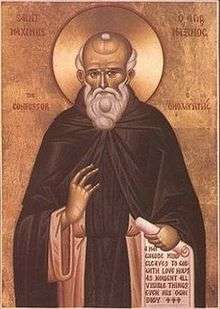March 3 (Eastern Orthodox liturgics)
March 2 - Eastern Orthodox liturgical calendar - March 4
All fixed commemorations below are observed on March 16 by Orthodox Churches on the Old Calendar.[note 1]
For March 3rd, Orthodox Churches on the Old Calendar commemorate the Saints listed on February 17 (February 18 on leap years).
Saints
- Martyrs Eutropius and Cleonicus of Amasea, and Basiliscus of Comana (308)[1][2][3]
- Venerable Piama, virgin (337)[2][4][5]
- Hieromartyr Theodoretus, Bishop, of Antioch, by beheading (361-363)[2][6]
- Venerable Alexandra of Alexandria (4th century)[2][7]
- Venerable Saints Zenon and Zoilus.[8][9][10]
- Venerable Shio Mgvime, monk, of Georgia (6th century)[11][note 2]
- Saint John IV (Chrysostom), Catholicos of Georgia (1001)[2][12]
- Saint John V (Chrysostom), Catholicos of Georgia (1048)[12][13]
Pre-Schism Western saints
- Martyrs Hemeterius and Cheledonius, believed to have been soldiers, suffered in Calahorra in Old Castile (ca. 298)[2][14][15]
- Saint Camilla, born in Civitavecchia, she became a disciple of St Germanus of Auxerre in France, where she lived as an anchoress (ca. 437)[14]
- Martyrs Felix, Luciolus, Fortunatus, Marcia and Companions, a group of forty martyrs in North Africa.[14]
- Saint Winwaloe, Abbot of Landévennec Abbey, Brittany (ca. 530)[2][14][16][note 3][note 4]
- Saint Titian of Brescia, Germanic by birth, became Bishop of Brescia in Italy (ca. 536)[14]
- Saint Caluppan of Auvergne in Gaul (576)[2][14][note 5]
- Saint Non (Nonnita, Nonna), mother of St. David of Wales (6th century)[2][14][note 6]
- Saint Foila (Faile), sister of St Colgan (6th century)[14][18][note 7]
- Saint Arthelais, one of the patron-saints of Benevento in Italy, where she fled from Constantinople (6th century)[14]
- Saint Lamalisse (Molaise of Leighlin), a hermit in Scotland, he left his name to the islet of Lamlash off the coast of the Isle of Arran in Scotland (7th century)[14]
- Saint Sacer (Mo-Sacra, Mosacra), founder of the monastery of Saggart near Dublin in Ireland (7th century)[14][19]
- Saint Cele-Christ, otherwise "Worshipper of Christ", a hermit for many years, eventually forced to become a Bishop in Leinster (ca. 728)[14][20]
- Saint Anselm, Abbott, founder of a monastery at Fanano, and the Nonantola Abbey (803)[14][note 8]
- Saint Cunigunde of Luxembourg, wife of Henry II, founder of Kaufungen Abbey (1039)[14][21][note 9]
Post-Schism Orthodox saints
- Holy 9 Martyrs of Georgia (Nine Brothers Kherkheulidze), at Marabda (1625)[23] (see also: August 3)
Other commemorations
Icon gallery
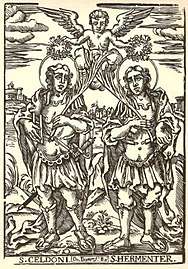 Martyrs Hemeterius and Cheledonius of Spain.
Martyrs Hemeterius and Cheledonius of Spain.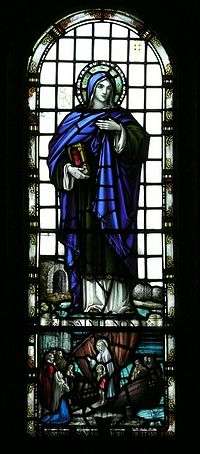 St. Saint Nonna, mother of St. David of Wales.
St. Saint Nonna, mother of St. David of Wales.- Henry II and St. Cunigunde of Luxembourg.
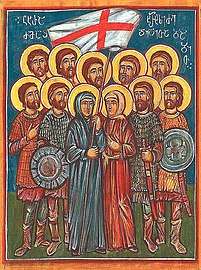 Icon of Nine Brothers Kherkheulidze with their Mother and Sister
Icon of Nine Brothers Kherkheulidze with their Mother and Sister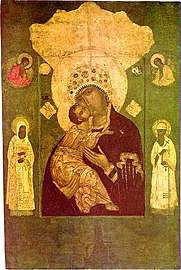 Volokolamsk Icon of the Most Holy Theotokos.
Volokolamsk Icon of the Most Holy Theotokos.
Notes
- The notation Old Style or (OS) is sometimes used to indicate a date in the Julian Calendar (which is used by churches on the "Old Calendar").
The notation New Style or (NS), indicates a date in the Revised Julian calendar (which is used by churches on the "New Calendar"). - The Georgian Orthodox Church commemorates St. Shio of Mgvime several times throughout the year:
- St. John of Zedazeni and his twelve disciples, among whom was St. Shio of Mgvime, are commemorated on May 7;
- the repose of St. Shio is celebrated on May 9;
- and on Cheese-fare Thursday the Church celebrates the miracle that, for centuries, occurred every year at St. Shio’s grave.
- Born in Brittany, he became a disciple of St Budoc on Lauren Island and founded the monastery at Landevennec. Several churches in Cornwall are dedicated to him, indicating that the saint had some connection there.
- "This Saint appears to have been born in the Continental Brittany, where he flourished in great sanctity; but his parents were of Great Britain, and consequently in some parts of the island he was venerated as a Saint of the country. In some calendars we find on this day, or on the 26th of February, St. Winwalorus, Bishop, which, it is presumed, is an error of the copyist for Winwalocus, Abbot."[17]
- A monk at Meallet in Auvergne in France, who lived as a hermit in a cave.
- "ST. NONNITA, or NONNA, the mother of St. David, was the daughter of Brechan, Prince of North Wales, and, like all her brothers and several of her sisters, professed the religious state. On one occasion she left her retreat, on a pilgrimage of devotion, and was unhappily seized and exposed to the sacrilegious violence of one of the princes of the country. Thus she became the mother of the illustrious Saint, who was one of the glories of the ancient British Church. There was no doubt as to the innocence of Nonnita; but it was expressly revealed, as well as the sanctity of the child yet unborn, to St. Gildas the elder, as he was preaching in a church, when she was present. She continued for the rest of her days to lead a life of penance and devotion. A chapel was dedicated to her near the Cathedral of St. David's, and the three first days of March were days of special devotion in honour of her son St. David, his companion St. Lily, and herself. In Brittany it has been a constant tradition, that she ended her life in that country, and in the parish of Dirinon. The church of that place is dedicated to St. David and St. Nonnita, and there her relics are said to be preserved. It is said that the Saint's true name was Melarie, and that the surname of Nonna or Nun indicates her religious profession."[17] A chapel and a well near her son's Cathedral still bear her name. Another can be found in Altarnum in Cornwall, where she may have moved and where her relics survived, even though she reposed in Brittany.
- The two are patron-saints of the parishes of Kil-Faile (Kileely) and Kil-Colgan in Galway in Ireland.
- Of noble origin, Anselm became a monk and founded one monastery in Fanano near Modena in Italy and a second one in Nonantola. He attached hospitals and hostels to both.
- "At Bamberg, the empress St. Cunegundes, who preserved her virginity with the consent of her husband, the emperor Henry I. She terminated a life rich in meritorius good deeds with a holy death and worked many miracles afterward."[22]
gollark: Yes.
gollark: Oh, I did quite like that.
gollark: PIERB policy requires that I have approximate knowledge of many TV shows.
gollark: I have, of course.
gollark: What kind of superintelligent magic computer box™ only helps something like one person per episode by using foolish humans to do stuff?
References
- Great Synaxaristes: (in Greek) Οἱ Ἅγιοι Βασιλίσκος, Εὐτρόπιος καὶ Κλεόνικος οἱ Μάρτυρες. 3 ΜΑΡΤΙΟΥ. ΜΕΓΑΣ ΣΥΝΑΞΑΡΙΣΤΗΣ.
- March 3/March 16. Orthodox Calendar (PRAVOSLAVIE.RU).
- Martyr Eutropius of Amasea. OCA - Lives of the Saints.
- Great Synaxaristes: (in Greek) Ἡ Ὁσία Πιαμοῦν ἡ Παρθένος. 3 ΜΑΡΤΙΟΥ. ΜΕΓΑΣ ΣΥΝΑΞΑΡΙΣΤΗΣ.
- Virginmartyr Piama. OCA - Lives of the Saints.
- Great Synaxaristes: (in Greek) Ὁ Ἅγιος Θεοδώρητος ὁ Ἱερομάρτυρας Ἐπίσκοπος Ἀντιοχείας. 3 ΜΑΡΤΙΟΥ. ΜΕΓΑΣ ΣΥΝΑΞΑΡΙΣΤΗΣ.
- Great Synaxaristes: (in Greek) Ἡ Ὁσία Ἀλεξάνδρα. 3 ΜΑΡΤΙΟΥ. ΜΕΓΑΣ ΣΥΝΑΞΑΡΙΣΤΗΣ.
- Great Synaxaristes: (in Greek) Οἱ Ὅσιοι Ζήνων καὶ Ζωΐλος. 3 ΜΑΡΤΙΟΥ. ΜΕΓΑΣ ΣΥΝΑΞΑΡΙΣΤΗΣ.
- (in Greek) Συναξαριστής. 3 Μαρτίου. ECCLESIA.GR. (H ΕΚΚΛΗΣΙΑ ΤΗΣ ΕΛΛΑΔΟΣ).
- (in Russian) 3 марта (ст.ст.) 16 марта 2013 (нов. ст.). Русская Православная Церковь Отдел внешних церковных связей. (DECR).
- Venerable Shio Mgvime. OCA - Lives of the Saints.
- St John (Chrysostom) IV, the Catholicos of Georgia. OCA - Lives of the Saints.
- Great Synaxaristes: (in Greek) Ὁ Ἅγιος Ἰωάννης Πατριάρχης Γεωργίας. 3 ΜΑΡΤΙΟΥ. ΜΕΓΑΣ ΣΥΝΑΞΑΡΙΣΤΗΣ.
- March 3. Latin Saints of the Orthodox Patriarchate of Rome.
- Rev. Sabine Baring-Gould (M.A.). "SS. EMETHERIUS AND CHELIDONIUS, MM. (UNCERTAIN DATE.)." In: The Lives of the Saints. Volume the Third: March. London: John C. Nimmo, 1897. p. 44.
- Rev. Sabine Baring-Gould (M.A.). "S. WINWALOE, AB. (6TH CENT.)." In: The Lives of the Saints. Volume the Third: March. London: John C. Nimmo, 1897. pp. 49-51.
- Rev. Richard Stanton. A Menology of England and Wales, or, Brief Memorials of the Ancient British and English Saints Arranged According to the Calendar, Together with the Martyrs of the 16th and 17th Centuries. London: Burns & Oates, 1892. pp. 98-100.
- Very Rev. John O'Hanlon. "Article III.—St. Foila or Foilenna, Virgin, and Patroness of Kill-faile, now Killeely Parish, County of Galway." In: Lives of the Irish Saints: With Special Festivals, and the Commemorations of Holy Persons. VOL. III. Dublin, 1875. pp. 103-104.
- Very Rev. John O'Hanlon. "ARTICLE I.—ST. SACER OR MO-SACRA, ABBOT OF SAGGARD, COUNTY OF DUBLIN. [SEVENTH CENTURY.]." In: Lives of the Irish Saints: With Special Festivals, and the Commemorations of Holy Persons. VOL. III. Dublin, 1875. pp. 99-101.
- Very Rev. John O'Hanlon. "Article VIII.—St. Cele Christ, or Christicola, Bishop of Kill-Cele-Chriost, in Ui-Donchadha, in Fotharta, Leinster. [Seventh and Eighth Centuries.]." In: Lives of the Irish Saints: With Special Festivals, and the Commemorations of Holy Persons. VOL. III. Dublin, 1875. pp. 105-108.
- Rev. Sabine Baring-Gould (M.A.). "S. KUNEGUND, EMPSS. (ABOUT A.D. 1040.)." In: The Lives of the Saints. Volume the Third: March. London: John C. Nimmo, 1897. pp. 52-54.
- The Roman Martyrology. Transl. by the Archbishop of Baltimore. Last Edition, According to the Copy Printed at Rome in 1914. Revised Edition, with the Imprimatur of His Eminence Cardinal Gibbons. Baltimore: John Murphy Company, 1916. pp. 64-65.
- Great Synaxaristes: (in Greek) Οἱ Ἅγιοι ἐννέα Μάρτυρες ἐκ Γεωργίας. 3 ΜΑΡΤΙΟΥ. ΜΕΓΑΣ ΣΥΝΑΞΑΡΙΣΤΗΣ.
- March 16 / March 3. HOLY TRINITY RUSSIAN ORTHODOX CHURCH (A parish of the Patriarchate of Moscow).
- Great Synaxaristes: (in Greek) Σύναξις Ὑπεραγίας Θεοτόκου τοῦ Βολοκολὰμσκ ἐν Ρωσίᾳ. 3 ΜΑΡΤΙΟΥ. ΜΕΓΑΣ ΣΥΝΑΞΑΡΙΣΤΗΣ.
- Icon of the Mother of God of Volokolamsk. OCA - Lives of the Saints.
Sources
- March 3/March 16. Orthodox Calendar (PRAVOSLAVIE.RU).
- March 16 / March 3. HOLY TRINITY RUSSIAN ORTHODOX CHURCH (A parish of the Patriarchate of Moscow).
- March 3. OCA - The Lives of the Saints.
- The Autonomous Orthodox Metropolia of Western Europe and the Americas (ROCOR). St. Hilarion Calendar of Saints for the year of our Lord 2004. St. Hilarion Press (Austin, TX). p. 19.
- March 3. Latin Saints of the Orthodox Patriarchate of Rome.
- The Roman Martyrology. Transl. by the Archbishop of Baltimore. Last Edition, According to the Copy Printed at Rome in 1914. Revised Edition, with the Imprimatur of His Eminence Cardinal Gibbons. Baltimore: John Murphy Company, 1916. pp. 64–65.
- Rev. Richard Stanton. A Menology of England and Wales, or, Brief Memorials of the Ancient British and English Saints Arranged According to the Calendar, Together with the Martyrs of the 16th and 17th Centuries. London: Burns & Oates, 1892. pp. 98–100.
Greek Sources
- Great Synaxaristes: (in Greek) 3 ΜΑΡΤΙΟΥ. ΜΕΓΑΣ ΣΥΝΑΞΑΡΙΣΤΗΣ.
- (in Greek) Συναξαριστής. 3 Μαρτίου. ECCLESIA.GR. (H ΕΚΚΛΗΣΙΑ ΤΗΣ ΕΛΛΑΔΟΣ).
Russian Sources
- (in Russian) 16 марта (3 марта). Православная Энциклопедия под редакцией Патриарха Московского и всея Руси Кирилла (электронная версия). (Orthodox Encyclopedia - Pravenc.ru).
- (in Russian) 3 марта (ст.ст.) 16 марта 2013 (нов. ст.). Русская Православная Церковь Отдел внешних церковных связей. (DECR).
This article is issued from Wikipedia. The text is licensed under Creative Commons - Attribution - Sharealike. Additional terms may apply for the media files.

